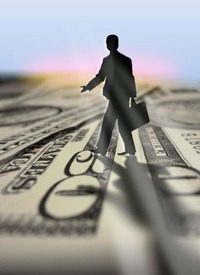
Nine financial firms that received a total of $32.6 billion through the government’s Troubled Asset Relief Program (TARP) paid their top traders and bankers more than $5 billion in bonuses last year, even as those same firms lost $81 billion, according to a report released on Thursday by New York Attorney general Andrew Cuomo.
JP Morgan Chase & Co, which received $25 billion in TARP money, topped the list with 1,626 employees receiving bonuses of at least $1 million each. Goldman Sachs Group, Inc. received $10 billion and shelled out bonuses of more than $1 million each to 953 of its top traders. Citi Group, recipient of $18 billion in TARP money, paid out seven-figure bonuses to 738 workers. Morgan Stanley paid bonuses of $1 million or more to 428 employees. Bank of America received $45 billion in TARP money, with $20 billion going to support its acquisition of Merrill Lynch. The bank gave 172 employees bonuses of $1 million or more, according to the report. Lehman Brothers Holdings Inc., Bank of New York Mellon, State Street Corp., and Wells Fargo were the other companies among the original nine to receive federal “bailout” money during last year’s credit crisis. The Cuomo report is the latest in a long string of criticisms of the Wall Street firms for having paid such large bonuses when the companies were losing money.
“If the bank lost money, where do you get the money to pay the bonus?” the attorney general asked. In January, President Obama called it “shameful” for the financial institutions to be rewarding themselves so lavishly while receiving government aid in a deepening recession. He even appointed Kenneth Feinberg as “pay czar” to scrutinize future bonuses paid by companies in the TARP program. But the real shame may be not in the executive compensation, but in the bipartisan “bailout,” with taxpayers’ dollars, of firms that have mismanaged their own and their clients’ finances. Rescuing private institutions from the consequences of bad management and appointing a “czar” to oversee compensation are not among the powers the Constitution delegates to either the president or the Congress.
Like most economic crises, the collapse of the financial markets was brought about in no small measure by government intervention in the marketplace. Banks were pressured under the Community Reinvestment Act to make home mortgages to people who couldn’t afford them. The weak mortgages were bundled with good mortgages and sold to investment bankers. Quasi-government institutions like Fannie Mae and Freddie Mac provided government-backed guarantees. When the bubble finally burst, then- Secretary of the Treasury Henry Paulson came up with a $700 billion solution that now has the U.S. government as an owner/manager in banking, auto, and other industries.
It’s not unusual for a government to create a crisis and then rush forward with a solution. The crisis is temporary; the expansion of government power is not. Of the nine institutions named above, all but three — Citigroup, Bank of America, and Wells Fargo — have already paid back their TARP loans. According to bank spokesman Tom Kelly, JP Morgan took the money “at the government’s request, even though we didn’t need it, because it was good for the overall financial system, and we paid it back as soon as we were allowed to.”
It sounds like our “leaders,” acting on our behalf, are saying, “Take our money — please!”



